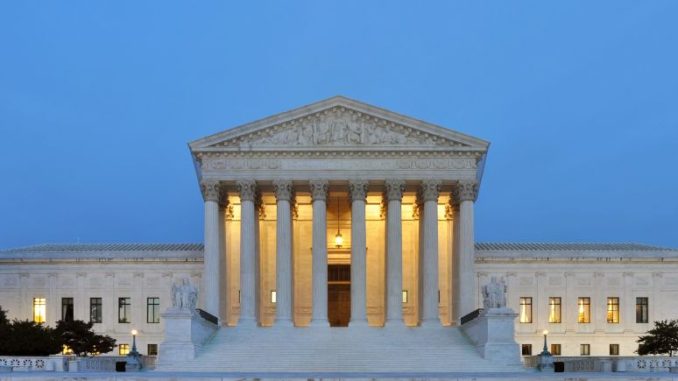
The Supreme Court has upheld the Trump Administration’s “travel ban”, in a 5-4 ruling for which Justice Roberts wrote the lead opinion. The case was Trump v. Hawaii, and there are a total of five opinions: Roberts’, a concurring opinion by Kennedy, a concurring opinion by Thomas, a dissenting opinion by Breyer (joined by Kagan), and a dissenting opinion by Sotomayor (joined by Ginsberg).
The complete opinions can be found here:
The crux of the decision can be found in many places throughout the text. An example:
By its plain language, §1182(f) grants the President broad discretion to suspend the entry of aliens into the United States. The President lawfully exercised that discretion based on his findings—following a worldwide, multi-agency review—that entry of the covered aliens would be detrimental to the national interest. And plaintiffs’ attempts to identify a conflict with other provisions in the INA, and their appeal to the statute’s purposes and legislative history, fail to overcome the clear statutory language.
Other concerns are addressed within the opinions. The decision by Congress to not act to restrict the President’s authority to issue such bans was taken as an admission of intent that the President was to be granted such authority.
Common sense and historical practice confirm as much. Section 1152(a)(1)(A) has never been treated as a constraint on the criteria for admissibility in §1182. Presidents have repeatedly exercised their authority to suspend entry on the basis of nationality. As noted, President Reagan relied on §1182(f) to suspend entry “as immigrants by all Cuban nationals,” subject to exceptions. Likewise, President Carter invoked §1185(a)(1) to deny and revoke visas to all Iranian nationals. (references deleted for ease of reading.)
It even addresses, with specificity, why the dominant opinion on the court is hesitant to act on this matter on behalf of the plaintiff:
The upshot of our cases in this context is clear: “Any rule of constitutional law that would inhibit the flexibility” of the President “to respond to changing world conditions should be adopted only with the greatest caution,” and our inquiry into matters of entry and national security is highly constrained. Mathews, 426 U. S., at 81–82. We need not define the precise contours of that inquiry in this case.
The issues of whether Trump was showing bias in the issuance of the order are addressed more substantively in the concurring opinion of Kennedy and some of the dissents. Ultimately, however, the decision was that no matter what might lie in the heart of the President, unless he is violating the law, he must not be unduly restricted from acting in accordance with the powers granted to him by the body of the electorate.
The court did not indicate that it in any way agreed or disagreed with the rationale behind the law nor that further challenges were invalid, but by covering most of the topics used to frame challenges and by stating challenges using those topics were unlikely to succeed, they have limited the available rationale dissenting lower court judges may use to validate such challenges.

1 Trackback / Pingback
Comments are closed.